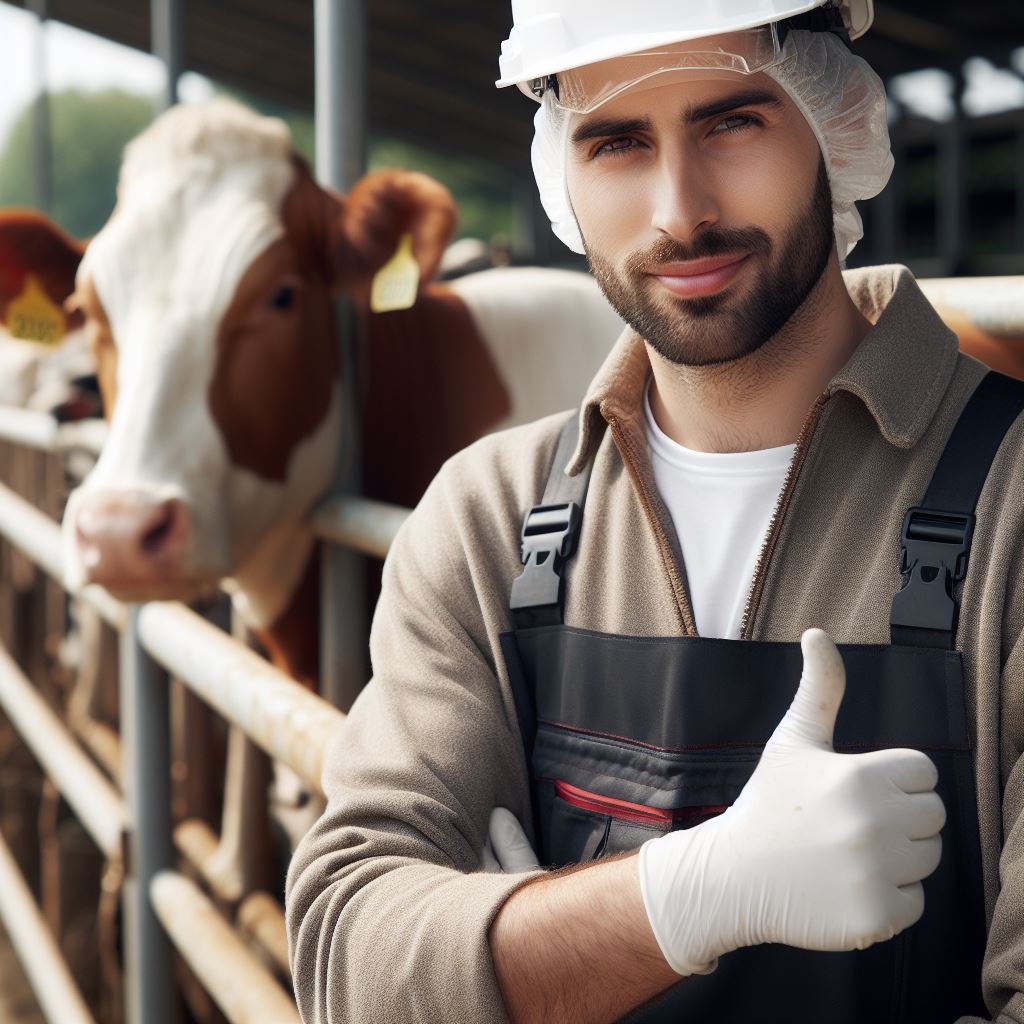Introduction
GPS Tracking in Livestock Management is the use of Global Positioning System to track the location of livestocks.
GPS is a technology that uses the Global Positioning System to pinpoint and monitor the location of an object or person in real-time.
It relies on satellite signals to calculate precise geographical coordinates, providing accurate and continuous information about the tracked entity’s whereabouts.
GPS tracking is widely used in navigation, fleet management, and security applications.
Livestock management is crucial for the proper care and productivity of livestock.
Proper management ensures optimal animal health, productivity, and resource utilization. Livestock contribute to diverse agricultural systems by providing meat, milk, and other products.
Efficient management practices enhance economic stability for farmers, fostering rural development.
Livestock also play a pivotal role in nutrient cycling, soil fertility, and pest control.
Implementing effective management strategies minimizes environmental impact, mitigates disease risks, and promotes animal welfare.
Additionally, livestock contribute to cultural practices and traditions worldwide, underscoring their social significance.
Sustainable livestock management is essential for global food production, rural livelihoods, and environmental balance.
Overview of the pros and cons of GPS tracking in livestock management
Pros of GPS Tracking in Livestock Management
- Increased Efficiency: GPS tracking allows for real-time monitoring of livestock, improving management practices.
- Enhanced Security: GPS tracking helps reduce theft and loss of livestock by providing accurate location information.
- Improved Health Management: Tracking can detect health issues early, enabling timely intervention for sick animals.
- Better Grazing Management: GPS data can help identify suitable grazing areas, preventing overgrazing and improving pasture utilization.
- Cost Savings: By optimizing livestock movement, GPS tracking reduces labor and fuel costs.
Cons of GPS Tracking in Livestock Management
- Initial Investments: Implementing GPS tracking systems can be expensive, especially for large-scale livestock operations.
- Privacy Concerns: Some people may have reservations about the constant monitoring of livestock animals.
- Technical Challenges: Connectivity issues and system malfunctions can hinder the effectiveness of GPS tracking.
- Training and Maintenance: Personnel require training to use and maintain GPS tracking systems correctly.
- Limited Accuracy: GPS signals can be affected by environmental factors, resulting in less precise tracking.
In essence, GPS tracking has several advantages, such as improved efficiency, security, and health management, but it also comes with drawbacks like initial investments and technical challenges.
It is crucial to carefully evaluate the specific needs and circumstances of livestock operations before implementing GPS tracking in livestock management.
Read: Best Chicken Breeds for Backyard Farms in the US
Pros of GPS Tracking in Livestock Management
GPS tracking technology has revolutionized livestock management in recent years, providing numerous benefits to farmers and ranchers.
Transform Your Agribusiness
Unlock your farm's potential with expert advice tailored to your needs. Get actionable steps that drive real results.
Get StartedIn this blog section, we will discuss the pros of GPS tracking in livestock management.
Increased efficiency in tracking the location of animals
One of the key advantages of GPS tracking in livestock management is the ability to efficiently track the location of animals.
With GPS collars or tags attached to the animals, farmers can easily monitor their whereabouts in real-time.
Ability to monitor large herds remotely
GPS tracking allows farmers to remotely track and monitor large herds of animals, eliminating the need for constant physical presence. This saves time and resources, particularly in extensive grazing systems.
Preventing unnecessary searching for lost animals
GPS tracking enables quick identification and location of lost animals, reducing the time and effort spent on searching. This ensures that animals are quickly found and brought back to safety.
Improved animal health and welfare
GPS tracking technology plays a crucial role in promoting animal health and welfare, leading to better overall management practices.
Early detection of illness or injury
By continuously monitoring the location and movement patterns of animals, GPS tracking systems can detect any abnormalities or changes in behavior.
This allows farmers to promptly identify signs of illness or injury and provide appropriate veterinary care.
Monitoring grazing patterns and identifying potential issues
GPS tracking enables detailed monitoring of grazing patterns, helping farmers identify areas or pastures that may be overgrazed or underutilized. This information allows for timely interventions, such as rotational grazing or pasture management, to maintain optimum forage availability for the animals.
Enhanced operational management and decision-making
GPS tracking technology provides valuable insights and data for improved operational management and informed decision-making processes.
Optimizing grazing patterns and land utilization
With real-time location data, farmers can analyze the movement patterns of their livestock and make more informed decisions regarding grazing patterns.
This helps optimize land utilization and prevents overgrazing, ensuring sustainable and efficient forage management.
Real-time data analysis for informed decision-making
GPS tracking systems generate a wealth of data that can be analyzed in real-time. This allows farmers to identify trends, patterns, and potential issues.
Such insights can contribute to better decision-making in areas like herd management, breeding, and feed allocation.
In fact, GPS tracking technology offers numerous advantages in livestock management.
It enhances efficiency in tracking animals’ location, improves animal health and welfare, and enhances operational management and decision-making processes.
With these benefits, farmers can optimize their practices, improve productivity, and ensure the well-being of their livestock.
Read: Starting a Poultry Farm: Essential Steps & Tips

Learn More: Biosecurity Tech: Safeguarding Your Livestock
Cons of GPS Tracking in Livestock Management
GPS tracking technology has revolutionized livestock management, providing farmers with valuable insights and advantages.
However, like any technology, GPS tracking also presents some drawbacks and challenges. In this section, we will explore the cons of GPS tracking in livestock management.
High initial investment and ongoing costs
A major concern when considering GPS tracking in livestock management is the high initial investment and ongoing costs involved.
Firstly, there is the expense of purchasing GPS tracking devices for each animal. These devices can be quite costly, especially when large herds are involved.
Additionally, there are maintenance and replacement costs, as these devices may require periodic updates or repairs.
Showcase Your Farming Business
Publish your professional farming services profile on our blog for a one-time fee of $200 and reach a dedicated audience of farmers and agribusiness owners.
Publish Your ProfileReliance on technology and potential system failures
Another drawback of GPS tracking is its reliance on technology and the potential for system failures.
Despite technological advancements, there is always a risk of malfunctions or glitches in the GPS tracking system.
This could lead to inaccurate data and compromise the effectiveness of managing livestock.
Moreover, GPS tracking heavily depends on proper GPS coverage, and in remote areas or places with poor connectivity, the system may be ineffective.
Ethical concerns regarding privacy and animal autonomy
Ethical concerns also arise when utilizing GPS tracking in livestock management. One of the main concerns is the infringement on animal freedom and natural behavior.
The use of tracking devices alters the animals’ ability to move freely and may restrict their natural instincts and behaviors. This raises questions about animal welfare and autonomy.
Additionally, there are privacy concerns related to data collection and monitoring. GPS tracking generates a vast amount of data about the livestock, their movements, and behaviors.
This information can be sensitive and personal, potentially compromising the privacy of the animals.
Furthermore, there is the concern that the collected data may be misused or fall into the wrong hands, posing a risk to both the animals and the farmers.
Essentially, while GPS tracking in livestock management offers numerous benefits, it is essential to consider the cons as well.
The high initial investment, ongoing costs, reliance on technology, potential system failures, ethical concerns regarding animal autonomy, and privacy issues must be carefully weighed when implementing GPS tracking systems.
Farmers and industry professionals should stay informed, address these drawbacks, and ensure the responsible and ethical use of GPS tracking in livestock management.
Read: Turkey Rearing 101: Basics for Beginners
Case Studies and Examples
Successful implementation of GPS tracking in livestock management
One of the key benefits of GPS tracking in livestock management is improved productivity and reduced losses.
Two successful case studies in this regard are the John Smith Farm and Miller’s Dairy Farm.
John Smith Farm, after implementing GPS tracking, witnessed increased productivity and reduced losses.
GPS tracking allowed them to track the whereabouts of their livestock, ensuring that none of the animals were lost or at risk.
This not only saved the farm valuable time and effort but also reduced financial losses associated with lost or stolen livestock.
Miller’s Dairy Farm also saw significant improvements in grazing rotation and land utilization with the help of GPS tracking.
By accurately monitoring the movement and grazing patterns of their animals, they were able to optimize the use of their land.
This resulted in better utilization of available resources, increased milk production, and improved overall efficiency of the farm.
Challenges faced and lessons learned
However, implementing GPS tracking in livestock management does not come without its challenges.
Two case studies highlight some of the difficulties faced by farms and the lessons learned from those experiences.
Green Valley Poultry Farm initially struggled with device maintenance and accuracy in their GPS tracking system.
The devices used for tracking were prone to malfunctions and required frequent maintenance.
Additionally, there were occasional inaccuracies in location data, which made it difficult for the farm to rely solely on GPS tracking for managing their poultry.
The lesson learned from this experience was the importance of investing in high-quality tracking devices and regular maintenance to ensure accurate and reliable data.
Another challenge faced by farms when implementing GPS tracking is the ethical debate surrounding animal autonomy.
Whitehorse Sheep Farm had to address concerns raised by stakeholders regarding the impact of GPS tracking on animal welfare and autonomy.
While GPS tracking provided valuable information for monitoring and managing the flock, there were debates about whether this compromised the animals’ natural instincts and freedom.
The lesson learned here was the importance of involving all stakeholders in the decision-making process and considering ethical implications before implementing GPS tracking in livestock management.
Generally, GPS tracking has shown successful implementation in livestock management, contributing to increased productivity, reduced losses, improved grazing rotation, and land utilization.
However, challenges such as device maintenance and accuracy, as well as ethical debates surrounding animal autonomy, must be addressed to fully benefit from GPS tracking technology.
By learning from the experiences of farms like John Smith Farm, Miller’s Dairy Farm, Green Valley Poultry Farm, and Whitehorse Sheep Farm, other livestock managers can navigate these challenges and make informed decisions regarding GPS tracking in their own operations.
Read: Poultry Health: Preventing Common Diseases
Conclusion
Recap of the pros and cons of GPS tracking in livestock management
GPS tracking in livestock management offers several advantages including improved animal welfare, enhanced theft prevention, and increased operational efficiency.
However, there are also drawbacks such as high initial costs, technical limitations, and potential privacy concerns.
Emphasis on the need for careful consideration and evaluation
Before implementing GPS tracking in livestock management, it is crucial to carefully evaluate its practicality, cost-effectiveness, and compatibility with existing systems.
It is important to consider the specific needs and requirements of the farm operation before making a decision.
Suggested potential future developments in GPS tracking technology for livestock management
As technology continues to advance, there are several potential future developments in GPS tracking that could further improve livestock management.
Showcase Your Farming Business
Publish your professional farming services profile on our blog for a one-time fee of $200 and reach a dedicated audience of farmers and agribusiness owners.
Publish Your ProfileThese include advancements in miniaturization, longer battery life, improved data analysis, and integration with other smart farming technologies.
GPS tracking has both pros and cons in livestock management. While it offers various benefits, it is important to carefully evaluate its suitability and feasibility for individual farm operations.
With the potential for future advancements, GPS tracking technology holds promising prospects for improving livestock management in the long run.




